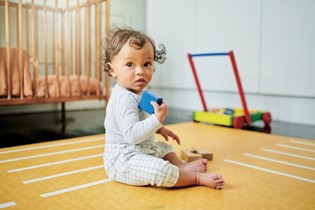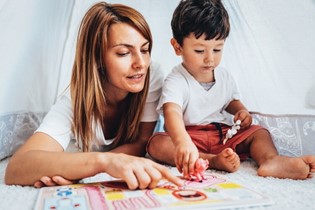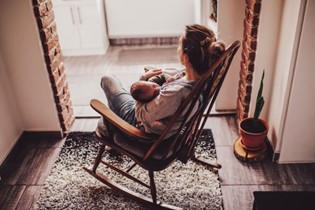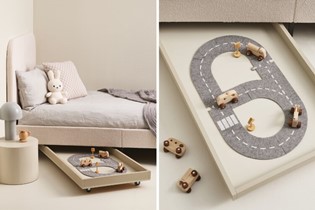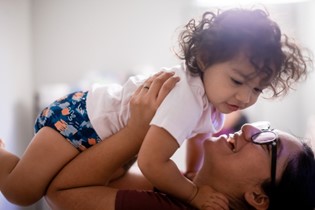Is the 'cry it out' method they only way to get a better night's sleep?

Is leaving your baby to ‘cry it out’ the only way to achieve a better night’s sleep? Annette Faamausilli from Serene Sleep answers her most commonly asked question.
I often get asked this question every week by parents who reach out to me wanting to put an end to the misery of sleep deprivation but are uncertain and anxious about what their new sleep journey will look like. Quality sleep is a major part of being a healthy adult. But, as a parent, sleep can feel very elusive. We all know it’s normal for babies to wake in the night but broken sleep over a prolonged period of time can take a significant and often unnecessary toll on your life.
So, what can you do? Do you really have to resort to sleep training techniques like the cry it out method? The answer is no, you don’t. There are plenty of other ways you can gently encourage better sleeping habits for the whole family.
MODERN SLEEP WOES
Many parents are used to feeling tired. After all, life is busy. With the current economic climate, most households have two working parents and a range of children to care for. If your children are waking through the night and you are working through the day, it doesn’t leave much time for sleep.
In times gone by, there would be a village of support to call on. But now, many grandparents and older family members live far away or are still working themselves. They can't provide the village-style support that previous generations have benefited from.
Prolonged sleep deprivation can have a significant impact, both physically and mentally. Not getting enough sleep can have serious repercussions in your day-to-day life and in the long term, such as:
+ Impaired brain power: lack of sleep can impact your cognitive function, affecting your ability to think clearly, make decisions and react quickly. This can lead to us making mistakes both at home and at work.
+ Increased stress and irritability: feel like you're always grumpy? Or maybe you are stressed to the max? That could be down to sleep deprivation. Not getting enough sleep increases your chances of feeling anxious, stressed or irritated.
+ Weaker immune system: sleep is essential in order for your body’s natural defenses to work properly. Not getting enough shuteye can weaken your immune system, making you more susceptible to getting sick.
+ Mental health: parents who are sleep deprived might have an increased risk of developing depression or heightening an existing condition.
+ Concentration: lack of sleep can impact your ability to concentrate. This can increase the risk of having an accident, particularly while driving or trying to complete household tasks.
+ Decreased productivity: feel like you are constantly treading water at work and not getting through as much as you want to? Not getting enough sleep could be the cause. Sleep deprivation can affect your focus and ability to perform tasks well.

IS SLEEP TRAINING THE ANSWER?
When it comes to sleep training, people sometimes assume you have to fall into one of two camps. Some oppose any training or intervention in a baby's sleep routine and want to continue responding to the baby's needs 24/7. The second camp advocates for strict sleep training, which involves shutting the bedroom door and ignoring a baby's cries until the morning.
The good news is that you can sit somewhere in the middle! You can gently help your baby or toddler learn how to sleep well by themselves. It’s like any new skill, you can empower them to learn gradually with the security of knowing you’re there to support them.
Solid restorative sleep is a skill that can be learnt and is something that everyone is capable of. Some little ones might just need more help than others to master it. That is where sleep training can come in handy. It provides your child with the right tools to enable successful independent sleep and the ability to soothe themselves when they wake. Sleep training is about changing the course of your child’s sleep for the benefit of the entire family. When parents are more rested, they are far more able to tackle what the day throws at them – whether it be work, family or something else!
ENCOURAGING OPTIMAL SLEEP
Alright, we know sleep is good, so how can you encourage your child to achieve optimal sleep without using the ‘cry it out’ method?
- Create a sleep routine
Having a familiar and predictable routine every sleep time allows your baby or toddler to thrive as their sleep space is always the same. Create a restful space in a darkened room and build a routine that works for your family. It can involve cuddles, feeding, story time, songs, back rubbing – whatever works. Use this routine for nap time as well as nighttime.
- Check for tired signs
Your little ones will begin to show tired signs when they are ready for rest. Miss those tired signs and you could fall into the dangerous territory of over-tiredness. Tired signs include rubbing their eyes, changes in mood (getting cranky!), yawning, losing focus or interest in toys, becoming very quiet, or getting clingier. Head to bed as soon as those signs emerge. Using age-appropriate awake windows is a good place to start when starting a new sleep routine.
- Give them a chance to settle
This is an important one. It can be really tempting to run to your child’s side the moment you hear them stirring. But, giving them the opportunity to settle themselves can help to build sleep independence. Give them a minute or two to see if they naturally drop back to sleep. Sometimes parents make the mistake of thinking their baby is fully awake when they are simply just stirring between sleep cycles.
- Not every wake needs a feed
Feeding your child every time they wake can create the ‘feed to sleep’ association and reinforce night wakes. So, it’s important to remember that waking does not need to equal feeding. They may simply need a pat on the back or a little snuggle to settle back to sleep. Only feed if they are genuinely hungry.
- Ditch the camera monitor
While camera monitors are great because they show you everything your baby is doing, they can also be detrimental as they draw you in to every murmur and movement. Many parents are incorrectly interpreting their baby’s normal wakefulness and head in too quickly to soothe them as soon as they open their eyes. If you’re in close proximity to baby overnight, try and switch the monitor off and instead use your maternal compass to interpret their cries.
Annette Faamausili is a baby and child sleep expert and has been advising and supporting parents since 2001. She trained and qualified in the NHS, UK, and moved to New Zealand with her Samoan husband and family in 2011. Annette has three children (Matilda 15, Oscar 12, and Lola 6) and lives on the beautiful Whangaparaoa Peninsula in Auckland. Is sleep deprivation getting you down? We are here to support you on your journey to achieve better sleep for a more connected and happier and harmonious family life. See more at serenesleep.co.nz

AS FEATURED IN ISSUE 62 OF OHbaby! MAGAZINE. CHECK OUT OTHER ARTICLES IN THIS ISSUE BELOW




